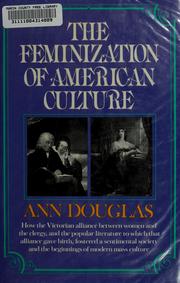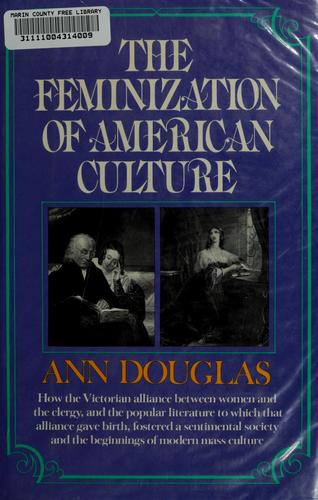Check nearby libraries
Buy this book

This is one of those rare books that let us see with a fresh and startling clarity the underlying causes, meaning, and influence through time of profound a cultural phenomenon. In it, a brilliant young scholar traces the roots of our modern consumer culture to the sentimental society of Victorian America.
With originality and sympathetic wit, Ann Douglas explores the alliance, beginning in 1820, of two disenfranchised groups: the women of the middle class and the liberal Protestant clergy, both increasingly relegated to the edges of society (to the parlor, to the Sunday School, to the libraries) by the prevailing entrepreneurial forces.
Ann Douglas shows us the ladies and the ministers cultivating a realm of "influence," becoming the cultural custodians, taking control of the schools, preaching a reverence for the very qualities that society imposed upon them: timidity, piety, childish naivete, a disdain for the competitive forces in the larger world. She gives us the missing social history of the Protestant minister in the Northeast, and the subtle decline of his inherited theology. She takes us through the magazines the women and the ministers edited (Ladies' Magazine, Godey's Lady's Book, The Ladies' Repository), through the etiquette books, into the saccharine biographies of ministers and the books about women that the ministers wrote (among them, Woman Suffrage: The Reform Against Nature) in which they tried to fix the correct "feminine" role or elaborate on woman's "beautiful errand."
She gives us the contemporary novels and tracts—lachrymose, narcissistic, riotously quirky, forgotten now but then wildly popular (The Empty Crib, Stepping Heavenward, as well as such scandalous books as Harriet Beecher Stowe's Lady Byron Vindicated). We see the authors, through their works, colonizing, even domesticating, heaven (heaven has houses, streets, pianos, food, and clothing), projecting the dead as a kind of consecrated leisure class in a celestial retirement village, conveying the impression that death widened their appointed sphere: the church, faith, manners, morals. . . . We see the prayer manuals and the flood of almost necrophiliac pamphlets that the Victorians devoured. . . . We see the women and the ministers competing for spiritual leadership in the community as they became more and more self-immersed.
We see vapidity masquerading as a sacred innocence, the moral life as a perpetual childhood, the church becoming progressively more anti-intellectual, the middle-class woman idealized not as doer but as n display case for the clothes and the pretty objects that man could lay at her feet, tragically contributing to her own exploitation, undermining all that was most authentic and creative in contemporary theology, romanticism, feminism. . . .
With a masterful grasp of the tentures and the tensions of Victorian life, Ann Douglas gives us, in counterpoint, the important work of the Romantics who were forced to exist without popular support—among them, Margaret Fuller, rejecting the feminine ideal propounded in the ladies' magazines, striking out to cultivate a sense of history, and a placesquarely within it, and Herman Melville, writing his vigorously anti-sentimental dramas of the sea and the city; both of them exalting the ideal of the singular self and soul that their culture increasingly disregarded.
This is a work of inspired scholarship and rich allusive power—an involving and fascinating portrait of Victorian America: its literature, its theology, its cultural legacy.—1977 jacket
Check nearby libraries
Buy this book

Previews available in: English
Subjects
American literature, Calvinism, Civilisation, Civilization, Clergy, Feminism and literature, History, History and criticism, Popular culture, Protestantism and literature, Religion and literature, Religious aspects, Religious aspects of Popular culture, Romanticism, Sentimentalism in literature, Women, Women and literature, Women authors, Clergé, Écrits de femmes américains, Vrouwenfiguren, Femmes, Schrijvers, Letterkunde, Littérature américaine, Histoire et critique, Victoriaanse tijd, Modern literature, Frauenliteratur, Frauenbild, American literature, women authors, American literature, history and criticism, 19th century, Popular culture, united states, Femininity, United states, civilization, 1783-1865, United states, civilization, 1865-1918Places
United States, États-UnisTimes
19th century, 19e siècle| Edition | Availability |
|---|---|
|
1
The feminization of American culture
1998, Noonday Press/Farrar, Straus and Giroux
in English
0374525587 9780374525583
|
zzzz
|
| 2 |
zzzz
|
|
3
The feminization of American culture
1988, Anchor Press/Doubleday
in English
0385242417 9780385242417
|
eeee
|
|
4
Feminization of American Culture
September 1983, Avon Books (Mm)
in English
038001968X 9780380019687
|
zzzz
|
| 5 |
eeee
|
|
6
The feminization of American culture
1977, Alfred A. Knopf
Hardcover
- 1st ed.
0394405323 9780394405322
|
aaaa
|
| 7 |
zzzz
|
| 8 |
zzzz
|
Book Details
First Sentence
"Henry James, Sr., religious maverick of no little waywardness and no less astuteness, judged that American Protestantism in the mid-nineteenth century was in a sad state of decline."
Edition Notes
Includes bibliographical references and index.
6
Classifications
Contributors
The Physical Object
Edition Identifiers
Work Identifiers
Source records
The Laurentian Library MARC recordIthaca College Library MARC record
University of Prince Edward Island MARC record
Internet Archive item record
OpenLibraries-Trent-MARCs record
marc_openlibraries_phillipsacademy MARC record
Marygrove College MARC record
Internet Archive item record
amazon.com record
marc_claremont_school_theology MARC record
Library of Congress MARC record
marc_claremont_school_theology MARC record
marc_columbia MARC record
marc_columbia MARC record
Harvard University record
Community Reviews (0)
History
- Created November 2, 2008
- 26 revisions
Wikipedia citation
×CloseCopy and paste this code into your Wikipedia page. Need help?
| December 13, 2023 | Edited by MARC Bot | import existing book |
| January 9, 2023 | Edited by MARC Bot | import existing book |
| December 11, 2022 | Edited by MARC Bot | import existing book |
| April 2, 2021 | Edited by Altercari | description |
| November 2, 2008 | Created by ImportBot | Imported from The Laurentian Library MARC record |














